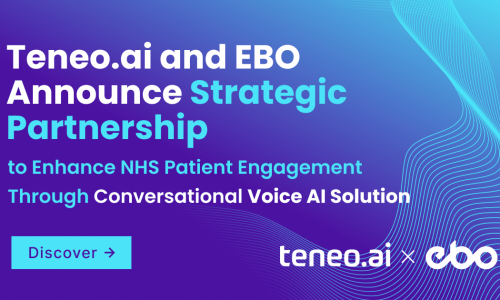How can AI augment human capability across patient services? How can we digitise patient-facing administrative processes to reduce staff burnout yet maintain empathy in communication with patients? Dr. Gege Gatt, CEO of EBO explores.
Prime minister Rishi Sunak has called to embed innovation across public services and has identified artificial intelligence (AI) as the technology which the UK needs to be most ambitious with.
Sunak emphasized the importance of radical innovation, stating that it will ‘really improve the quality and speed of care’. This is significantly relevant to the current NHS’s waiting list backlog where 36% of patients have been waiting more than 18 weeks for treatment. Never has there been a more pressing need to explore the role AI can play in improving access to treatment.

AI augments human capability, not replaces it
Augmenting human capability through AI can make a major difference in times of staff shortages and an increasing demand for healthcare. This is especially so in administrative support where a large extent of workforce burnout is registered in the NHS.
The idea that AI is here to replace human agency is a common misconception. However, it cannot. I see the future of patient engagement as a combination of both human capability and technology, working interconnectedly. For example, if an AI platform cannot understand the patient’s sentiment in an interaction, it is escalated to a human.
In order for AI to support the NHS’s challenges, we must go beyond hospital-centric IT solutions (patient portals or native mobile apps) and move towards patient engagement tools that can communicate with empathy and can support a holistic operational response.
This form of adoption relies on the ability to build a patient’s trust in AI. At EBO, this is achieved by building an AI-powered Virtual Assistant solution that is based on empathy and natural conversation. This enables healthcare systems to manage most patient requests at scale, in a timely and convenient manner.
Conversational AI
Conversational AI in healthcare can automate patient-facing administrative processes that are repetitive and inefficient in nature, enabling staff to re-focus their attention on more complex activities.
The Virtual Assistant’s ability to understand ‘context’ and hold a human-like conversation also reduces complexity and digital literacy requirements from patients, such as form-filling. It enables asynchronous communication, overcomes language barriers and supports effective access to public health.
By understanding natural language, in a multilingual environment, on communication channels that are culturally accepted by the patient, we can better engage patients digitally.
Whilst hospital-centric IT solutions strip away the human-touch from digital pathways, EBO’s Virtual Assistant restores empathy and compassion by understanding contextual and environmental data.
Virtual Assistants in action
Currently, 6 NHS Trusts are benefitting from automated patient processes via EBO’s Virtual Assistant. One use case which is proving to deliver significant efficiency gains for trusts is the self-management of patients’ appointments via a trust’s website.
When seeking to cancel an outpatient appointment, patients would typically visit the trust website and find instructions to contact the call centre during opening hours. The patient is often left frustrated, unable to cancel their appointment on the website at a time that suits them and directing yet a higher volume of calls to the contact centre.
Redirecting patients back to non-digital channels not only fails to alleviate administrative workload but in fact creates a bottleneck of requests for admin teams to manage when the patient phones in.
Virtual Assistants act as a digital front door, turning a trust’s website into a two-way human-like conversation that can apply appropriate empathy and compassion. This radically improves the patient experience and alleviates administrative workload at the same time.
Virtual Assistants work via a chat function on the trust’s website which integrates with the electronic patient record. Patient messages and questions are interpreted with custom responses crafted in real-time whilst tracking patient sentiment.
It provides an automated pathway to satisfy a significant volume of requests emerging from patients which would otherwise have required human intervention. It also satisfies patient expectations with regards to either immediate response or redirection to a staff member who can address their query.

Accelerating adoption across the NHS
Somerset NHS Foundation Trust is applying conversational AI to more complex use cases for patient-led appointments. The Trust’s patients can view their appointments, request cancellations and reschedule appointments easily and efficiently using their Virtual Assistant, named Alex.
Kim Hale, the NHS trust’s Digital Change Lead says, “Our booking officers absolutely love our Virtual Assistant Alex, since it does the legwork and they can focus on the patient.” Kim goes on to say that Alex has saved 24 hours of staff time per week. Automating large volumes of patient administrative requests allows staff to focus on the more complex requests.
“Our callers come from diverse cultural and linguistic backgrounds, so we worked with our communication to make sure Alex understands all our patients and the different ways they communicate,” she says.
With the Virtual Assistant working in three service areas and with plans to roll it out across outpatient services, Kim says their “goal is to make it easier for patients and improve how we communicate with them”.
Co-producing innovation in the NHS
How can we work together to further patient-centricity goals like Somerset’s through the use of AI and automation technology?
As part of our EBO Health Skunkworks initiative, EBO is committing £10 million to help the digital transformation of NHS trusts by turning patient forms into automated conversations.
This initiative will support up to 20 new projects that aim to improve patient experience and reduce administrative burden via the use of health AI Virtual Assistants. We warmly invite NHS teams to join us on this exciting journey.
If you are interested in applying for EBO’s Skunkworks funding, contact us here or call us on 0800 009 6963.


